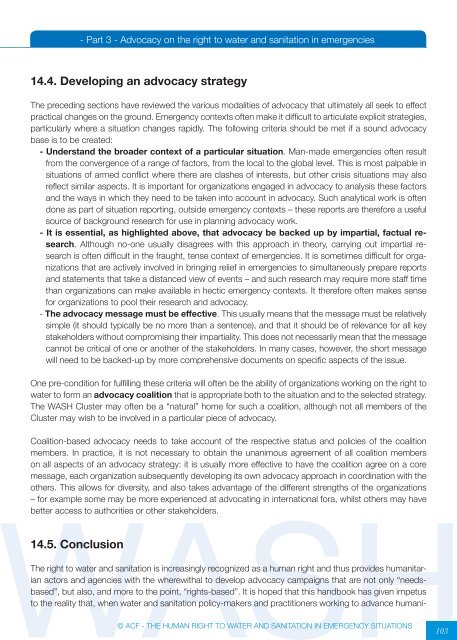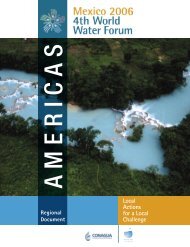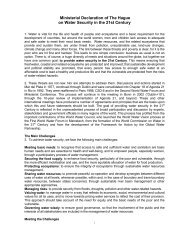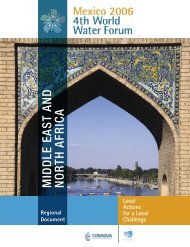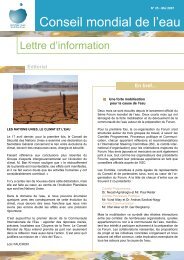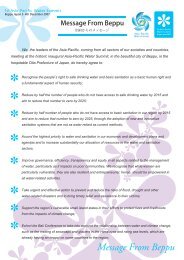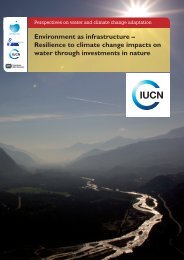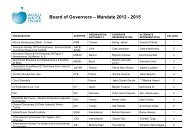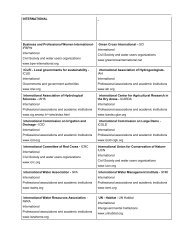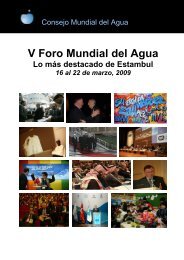the human right to water and sanitation in emergency situations
the human right to water and sanitation in emergency situations
the human right to water and sanitation in emergency situations
Create successful ePaper yourself
Turn your PDF publications into a flip-book with our unique Google optimized e-Paper software.
14.4. Develop<strong>in</strong>g an advocacy strategy<br />
The preced<strong>in</strong>g sections have reviewed <strong>the</strong> various modalities of advocacy that ultimately all seek <strong>to</strong> effect<br />
practical changes on <strong>the</strong> ground. Emergency contexts often make it difficult <strong>to</strong> articulate explicit strategies,<br />
particularly where a situation changes rapidly. The follow<strong>in</strong>g criteria should be met if a sound advocacy<br />
base is <strong>to</strong> be created:<br />
- underst<strong>and</strong> <strong>the</strong> broader context of a particular situation. Man-made emergencies often result<br />
from <strong>the</strong> convergence of a range of fac<strong>to</strong>rs, from <strong>the</strong> local <strong>to</strong> <strong>the</strong> global level. This is most palpable <strong>in</strong><br />
<strong>situations</strong> of armed conflict where <strong>the</strong>re are clashes of <strong>in</strong>terests, but o<strong>the</strong>r crisis <strong>situations</strong> may also<br />
reflect similar aspects. It is important for organizations engaged <strong>in</strong> advocacy <strong>to</strong> analysis <strong>the</strong>se fac<strong>to</strong>rs<br />
<strong>and</strong> <strong>the</strong> ways <strong>in</strong> which <strong>the</strong>y need <strong>to</strong> be taken <strong>in</strong><strong>to</strong> account <strong>in</strong> advocacy. Such analytical work is often<br />
done as part of situation report<strong>in</strong>g, outside <strong>emergency</strong> contexts – <strong>the</strong>se reports are <strong>the</strong>refore a useful<br />
source of background research for use <strong>in</strong> plann<strong>in</strong>g advocacy work.<br />
- It is essential, as highlighted above, that advocacy be backed up by impartial, factual research.<br />
Although no-one usually disagrees with this approach <strong>in</strong> <strong>the</strong>ory, carry<strong>in</strong>g out impartial research<br />
is often difficult <strong>in</strong> <strong>the</strong> fraught, tense context of emergencies. It is sometimes difficult for organizations<br />
that are actively <strong>in</strong>volved <strong>in</strong> br<strong>in</strong>g<strong>in</strong>g relief <strong>in</strong> emergencies <strong>to</strong> simultaneously prepare reports<br />
<strong>and</strong> statements that take a distanced view of events – <strong>and</strong> such research may require more staff time<br />
than organizations can make available <strong>in</strong> hectic <strong>emergency</strong> contexts. It <strong>the</strong>refore often makes sense<br />
for organizations <strong>to</strong> pool <strong>the</strong>ir research <strong>and</strong> advocacy.<br />
- The advocacy message must be effective. This usually means that <strong>the</strong> message must be relatively<br />
simple (it should typically be no more than a sentence), <strong>and</strong> that it should be of relevance for all key<br />
stakeholders without compromis<strong>in</strong>g <strong>the</strong>ir impartiality. This does not necessarily mean that <strong>the</strong> message<br />
cannot be critical of one or ano<strong>the</strong>r of <strong>the</strong> stakeholders. In many cases, however, <strong>the</strong> short message<br />
will need <strong>to</strong> be backed-up by more comprehensive documents on specific aspects of <strong>the</strong> issue.<br />
One pre-condition for fulfill<strong>in</strong>g <strong>the</strong>se criteria will often be <strong>the</strong> ability of organizations work<strong>in</strong>g on <strong>the</strong> <strong>right</strong> <strong>to</strong><br />
<strong>water</strong> <strong>to</strong> form an advocacy coalition that is appropriate both <strong>to</strong> <strong>the</strong> situation <strong>and</strong> <strong>to</strong> <strong>the</strong> selected strategy.<br />
The WASH Cluster may often be a “natural” home for such a coalition, although not all members of <strong>the</strong><br />
Cluster may wish <strong>to</strong> be <strong>in</strong>volved <strong>in</strong> a particular piece of advocacy.<br />
Coalition-based advocacy needs <strong>to</strong> take account of <strong>the</strong> respective status <strong>and</strong> policies of <strong>the</strong> coalition<br />
members. In practice, it is not necessary <strong>to</strong> obta<strong>in</strong> <strong>the</strong> unanimous agreement of all coalition members<br />
on all aspects of an advocacy strategy: it is usually more effective <strong>to</strong> have <strong>the</strong> coalition agree on a core<br />
message, each organization subsequently develop<strong>in</strong>g its own advocacy approach <strong>in</strong> coord<strong>in</strong>ation with <strong>the</strong><br />
o<strong>the</strong>rs. This allows for diversity, <strong>and</strong> also takes advantage of <strong>the</strong> different strengths of <strong>the</strong> organizations<br />
– for example some may be more experienced at advocat<strong>in</strong>g <strong>in</strong> <strong>in</strong>ternational fora, whilst o<strong>the</strong>rs may have<br />
better access <strong>to</strong> authorities or o<strong>the</strong>r stakeholders.<br />
14.5. Conclusion<br />
- Part 3 - Advocacy on <strong>the</strong> <strong>right</strong> <strong>to</strong> <strong>water</strong> <strong>and</strong> <strong>sanitation</strong> <strong>in</strong> emergencies<br />
The <strong>right</strong> <strong>to</strong> <strong>water</strong> <strong>and</strong> <strong>sanitation</strong> is <strong>in</strong>creas<strong>in</strong>gly recognized as a <strong>human</strong> <strong>right</strong> <strong>and</strong> thus provides <strong>human</strong>itarian<br />
ac<strong>to</strong>rs <strong>and</strong> agencies with <strong>the</strong> wherewithal <strong>to</strong> develop advocacy campaigns that are not only “needsbased”,<br />
but also, <strong>and</strong> more <strong>to</strong> <strong>the</strong> po<strong>in</strong>t, “<strong>right</strong>s-based”. It is hoped that this h<strong>and</strong>book has given impetus<br />
<strong>to</strong> <strong>the</strong> reality that, when <strong>water</strong> <strong>and</strong> <strong>sanitation</strong> policy-makers <strong>and</strong> practitioners work<strong>in</strong>g <strong>to</strong> advance <strong>human</strong>i-<br />
© ACF - THE HUMAN RIGHT TO WATER AND SANITATION IN EMERGENCY SITUATIONS<br />
103


